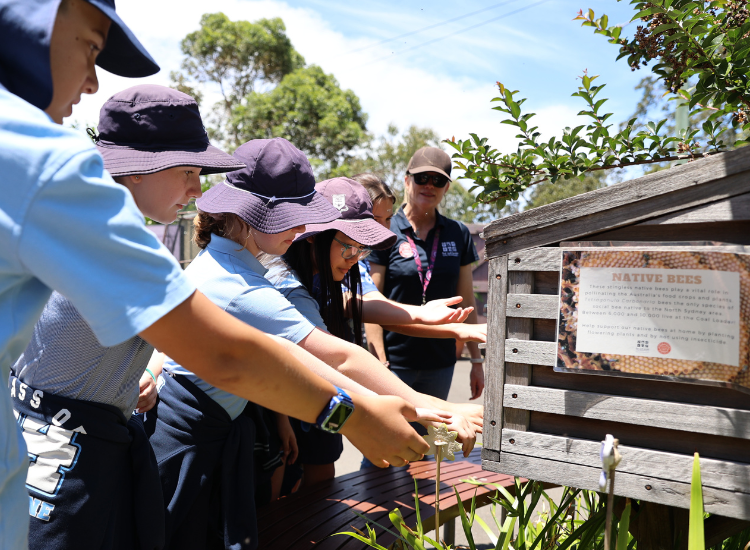Book a facilitated excursion
The Coal Loader offers a range of full-day, teacher-led, Stage 2 and Stage 3 Science and Geography and Stage 5 Science excursions that are fully curriculum linked.
Schools within the North Sydney LGA can take part in these excursions for free. For out-of-area schools, excursions cost $15 per head for Department of Education schools and $30 per head for non-Department of Education schools.
Students will engage in unique, fun, hands-on activities across the iconic site, focusing on the sustainability features of the centre and linked to the following topics:
Stage 5 Science: Environmental Sustainability and Energy
Students will be engaged in a series of hands-on lessons which immerse them in the S5 Science topics of ‘Energy’ and ‘Environmental Sustainability’.
The program has four focus areas including experiments to test thermal comfort, a scavenger hunt to discover for the Centre’s many sustainability features, an investigation of the urban heat island effect using infra-red thermometers, and an exploration of renewable and non renewable energy sources, including making and testing solar cars.
Environmental Sustainability outcomes
- SC5-ENV-01 A student analyses the impact of human activity on the natural world.
- SC5-WS-07 A Student selects suitable problem-solving strategies and evaluates proposed solutions to identify problems.
Energy outcomes
- SC5-EGY-01 A student evaluates current and alternative energy use based on ethical and sustainability considerations.
- SC5-WS-01 A student selects and uses scientific tools and instruments for accurate observations.
- SC5-WS-04 A student follows a planned procedure to undertake safe, ethical, valid and reliable investigations.
- SC5-WS-07 A student selects suitable problem-solving strategies and evaluates proposed solutions to identified problems.
Stage 2 Geography: The Earth’s Environment
Excursion activities include: Map and compass use to locate human and natural features, weather data collection using scientific equipment, an introduction to sustainability definitions and examples, musical peer interviews about sustainability, “I Spy” around the Coal Loader Centre for Sustainability and parachute games.
Key inquiry questions
- How does the environment support the lives of people and other living things?
- How do different views about the environment influence approaches to sustainability?
- How can people use places and environments more sustainably?
Outcomes
A student:
- examines features and characteristics of places and environments GE2-1
- describes the ways people, places and environments interact GE2-2
- examines differing perceptions about the management of places and environments GE2-3
- acquires and communicates geographical information using geographical tools for inquiry GE2-4
Stage 3 Geography: Factors that Shape Place
Excursion activities include: investigating a wetland area, its function and the biodiversity through observations; analysing what waste is, how it impacts our environment and solutions like a circular economy for products; using ID charts to observe pollinators and support biodiversity by creating pollinator seed bombs and water stands; and redesigning a home to incorporate environmentally sustainable features.
Key inquiry questions
- How do people and environments influence one another?
- How do people influence places and the management of spaces within them?
Outcomes
A student:
- describes the diverse features and characteristics of places and environments GE3-1
- explains interactions and connections between people, places and environments GE3-2
- compares and contrasts influences on the management of places and environments GE3-3
- acquires, processes and communicates geographical information using geographical tools for inquiry GE3-4
Stage 2 Science and Technology: Living World
Excursion activities include: Exploration walk searching for living things, introduction to frogs and frogs life cycle, structural and behavioural adaptation, food web wide game, investigation of the wetland and an assessment if the Striped Marsh Frog live would there, data collection including wetland observations and invertebrate tree shakes.
Key inquiry questions
- How do physical conditions affect the survival of living things?
- How do the structural and behavioural features of living things support survival?
Outcomes
A student:
- plans and conducts scientific investigations to answer testable questions, and collects and summarises data to communicate conclusions ST3-1WS-S
- examines how the environment affects the growth, survival and adaptation of living things ST3-4LW-S
Stage 3 Science and Technology: Physical World
Excursion activities include: An introduction to solar energy through building and racing solar powered cars, investigative artwork to demonstrate how plants use the sun’s energy, experimenting with sunlight to create heat to cook a marshmallow in a pizza box and a scavenger hunt to collect data of sustainable energy features available for houses.
Key inquiry questions
- How do light, heat and electrical energy make things happen?
- How can we use forces and energy in a product or system?
Outcomes
A student:
- ST2-8PW-ST describes the characteristics and effects of common forms of energy, such as light and heat
- ST2-1WS-S questions, plans and conducts scientific investigations, collects and summarises data and communicates using scientific representations
- ST2-3DP-T defines problems, describes and follows algorithms to develop solutions
Suggested schedule (can be tailored)
|
9.15am |
Arrive, toilets, sip and crunch, divide in groups, introduction |
|
9.30am to 10.15am |
Session 1 (45 min) |
|
10.15am to 10.45am |
Morning tea (30 min) |
|
10.45am to 11.30am |
Session 2 (45 min) |
|
11.30am to 11.35am |
Walk to next session |
|
11.35am to 12.20pm |
Session 3 (45 min) |
|
12.20pm to 1pm |
Lunch (40 min) |
|
1pm to 1.45pm |
Session 4 (45 min) |
|
1.45pm to 2pm |
Wrap up, toilet |
|
2pm |
Buses pick up |
Risk Assessment and permission form can be provided.
If you’d like to find out more information, please contact our team: coalloader@northsydney.nsw.gov.au
Please call Observatory Hill Environmental Education Centre on 02 9247 7321 or email observhill-e.school@det.nsw.edu.au to establish available dates before submitting the booking form.
After confirming with Observatory Hill Environmental Education Centre, please complete our booking form:



